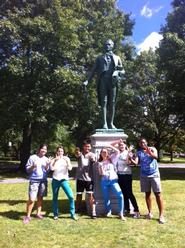
The Leadership Experience And Preparation (LEAP) program, developed through a partnership between Hamilton students, the Dean of Students Office and the Levitt Center, is a residentially based mentoring and leadership program that is being implemented for the first time this year. Its inaugural class of 59 first-year students will live together primarily in the Wertimer and Root residence halls, and work together in smaller groups under the leadership of upperclass student mentors.
Meredith Bonham, senior associate dean of students for strategic initiatives, expressed her high hopes for the program. “Hamilton has an historic tradition of creating leaders among its alumni, and LEAP creates an opportunity for students to develop the necessary leadership skills and self-awareness from the moment they step on campus,” she explained.
The LEAP curriculum will be divided into two main parts. During the fall semester, LEAP participants will engage in group activities, attend a Leadership Speaker Series, and participate in a variety of leadership training sessions. The leadership training during this segment of the curriculum will focus primarily on helping students develop critical leadership skills, including self-awareness, organization, negotiation, active listening, public speaking, and networking.
In the spring semester, the participants will then use the leadership skills they learned in the fall to work together and complete a group leadership project of their choosing. The project may arise in a variety of forms, but the ultimate goal of the project will be to create a positive change at Hamilton.
LEAP originally began as a Levitt Leadership Institute commitment project last spring; students Meghan O’Sullivan ’15 and Jack Boyle ’15 took over the program as its directors this fall. It is in this way that student leadership emerged as a major theme within the development of the program itself. O’Sullivan and Boyle have spent the past several months organizing program logistics, overseeing the mentor selection process, creating the training materials and activities schedule, as well as troubleshooting any issues that arose as the program began.
Because O’Sullivan is very grateful for the support she received from her own mentors during her first-year at Hamilton, her involvement in LEAP is her way of returning the favor and giving back to the Hamilton community.
“The role of a mentor is extremely important when someone is adjusting to a new environment, and I believe that a mentor should be someone who interacts with students throughout their first semester, not just in the first few days or weeks,” she said. “Through this program, I hope that first-years will feel more empowered to take on leadership roles on campus right from the start of their time at Hamilton,” O’Sullivan noted, “and that LEAP will teach them skills—and help encourage friendships—that they’ll have even after they graduate.”
In addition to the program’s exemplary mentors, the program also could not exist without the participation of its driven first-year students. When asked what they hope to get out of the program, the participants’ responses kept coming back to this overarching theme of the power and ability of students to create change and a sense of community here on the hill. Taylor Elicegui ’17 remarked, “I think I will gain a broad knowledge of skills, knowledge of the Hamilton community, and make some new friends along the way.”
Alexandru Hirsu ’17 added, “I hope I will perfect my negotiating and public speaking skills, and that I will learn how to differentiate clearly between when to be the leader of the team and when to be…a trustworthy teammate.”
Chris Willemsen, associate director of the Levitt Center and advisor to the LEAP Program, looks forward to seeing LEAP participants grow and develop over the course of the program. “I hope and expect that many of these students will go on to use their leadership skills to make a difference in their communities as they create innovative programs, improve existing initiatives, sustain successful organizations; and in so doing, influence many other Hamilton students to do the same,” Willemsen remarked.
With that being said, it can be expected that other campus programs will be looking to LEAP as a model for future programs as the program continues to develop. O’Sullivan also hopes that LEAP will effectively “demonstrate the capacity of students to take on serious positions of leadership and to truly direct their own initiatives.”
Using Bonham’s words, “By encouraging healthy decision-making and responsible role-modeling, there is no question that LEAP will have a positive impact on our campus.”
In addition to O’Sullivan and Boyle, the other LEAP Mentors are as follows: Andrew Nichols ’14, Isaac Handley-Miner ’14, Jessica Moulite ’14, Marla Marquez ’14, Morgan Markman ’14, Sarah Pfund ’14, Maggie Doolin ’14, Brady Sprague ’15, Eren Shultz ’15, Nicole LaBarge ’15, Ramon Villalona ’16 and Hunter Green ’16.
Posted September 18, 2013
